ARE THEY REALLY OBSESSED?: FANDOMS AND FANGIRLS WITHIN THE MUSIC INDUSTRY
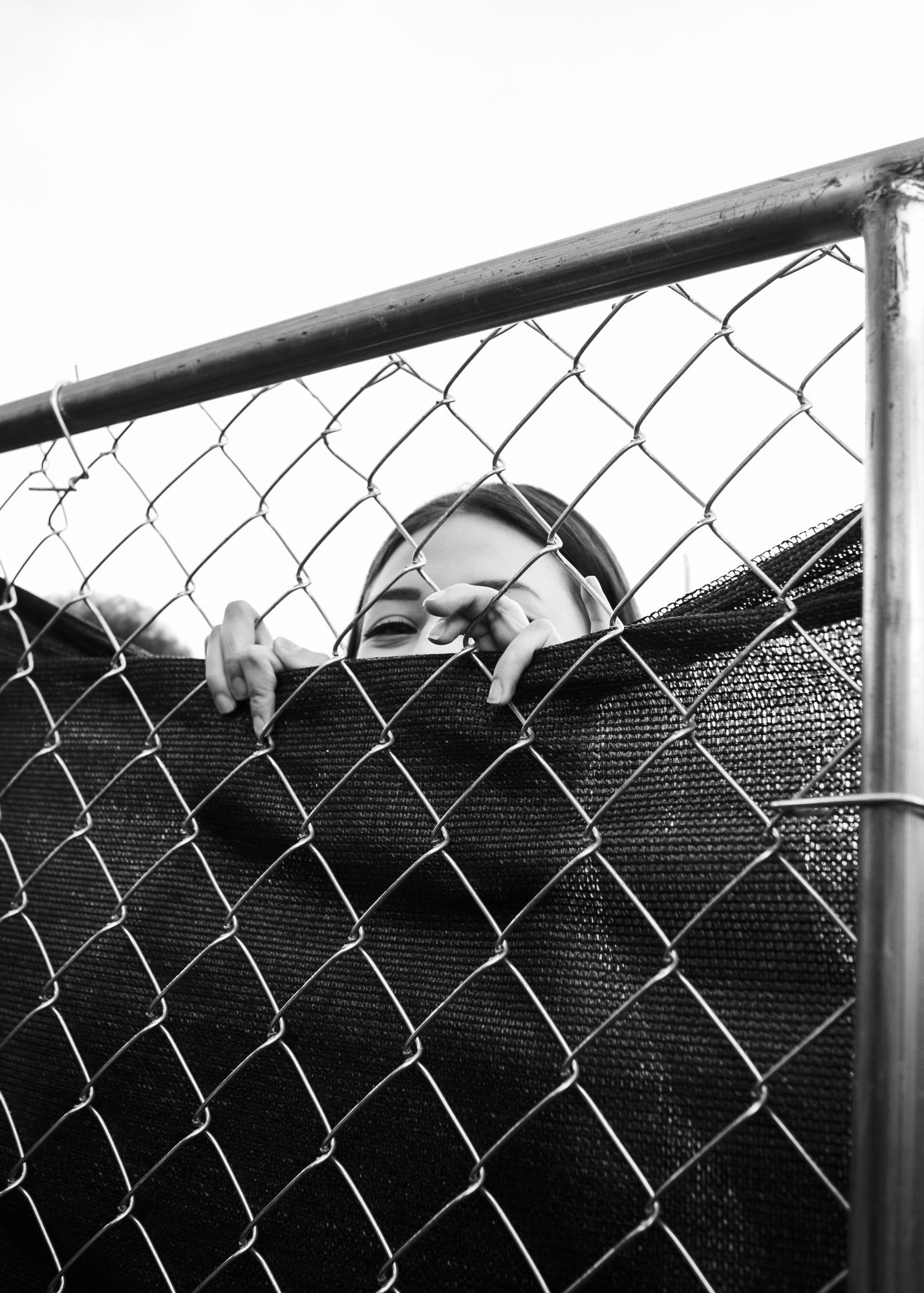
TW: This project contains references to harassment and suicide. If you have been affected by any of the topics mentioned, resources are available at the end.
I can still remember the intense pressure I put on the day being just right. I can still feel my heart beating in my chest, remembering excited nerves and anticipation. I can still hear when the crowd went eerily silent. I can still remember the ringing in my ears from deafening screams. I still wear my first ever tour top which has now been worn to the point where you can only just about distinguish which faded face is which. As trivial as it sounds, the first time I saw One Direction live was the most important day of my young teenage life.

Me outside Wembley Stadium, 2014
Me outside Wembley Stadium, 2014
My early memories of music come from my mum playing Arctic Monkeys and the Scissor Sisters through a silver Nokia phone in the kitchen. The Smiths’ The Queen is Dead on cassette in the car and Kylie Minogue on CD in the bedroom. I had a thing for S Club 7 as a toddler, I liked the Jonas Brothers and Cheryl Cole for a bit. I even collected a couple of Jessie J and JLS albums for a while, but it wasn't until that picture-perfect X-Factor boyband in 2010 that I could really call myself a fan.
Although connections to bands and artists like this from older generations are not often seen, my mum was the first to show me that anyone and everyone can be a fangirl. If it wasn’t for her love for The Killers, more specifically Brandon Flowers, I wouldn’t have seen that passion for fandom. Without her connection to music, she might not have encouraged and supported me to go to shows or buy merch. By not brushing off my interest as some ‘phase’, she allowed me to be unforgivingly and unashamedly a fangirl.
"The amount of love that exists in a venue when you have hundreds or thousands of people focusing their energy on shared appreciation of one thing is so special and is so hard to find elsewhere in life."
Jessica Lehrman in Up Close and Personal
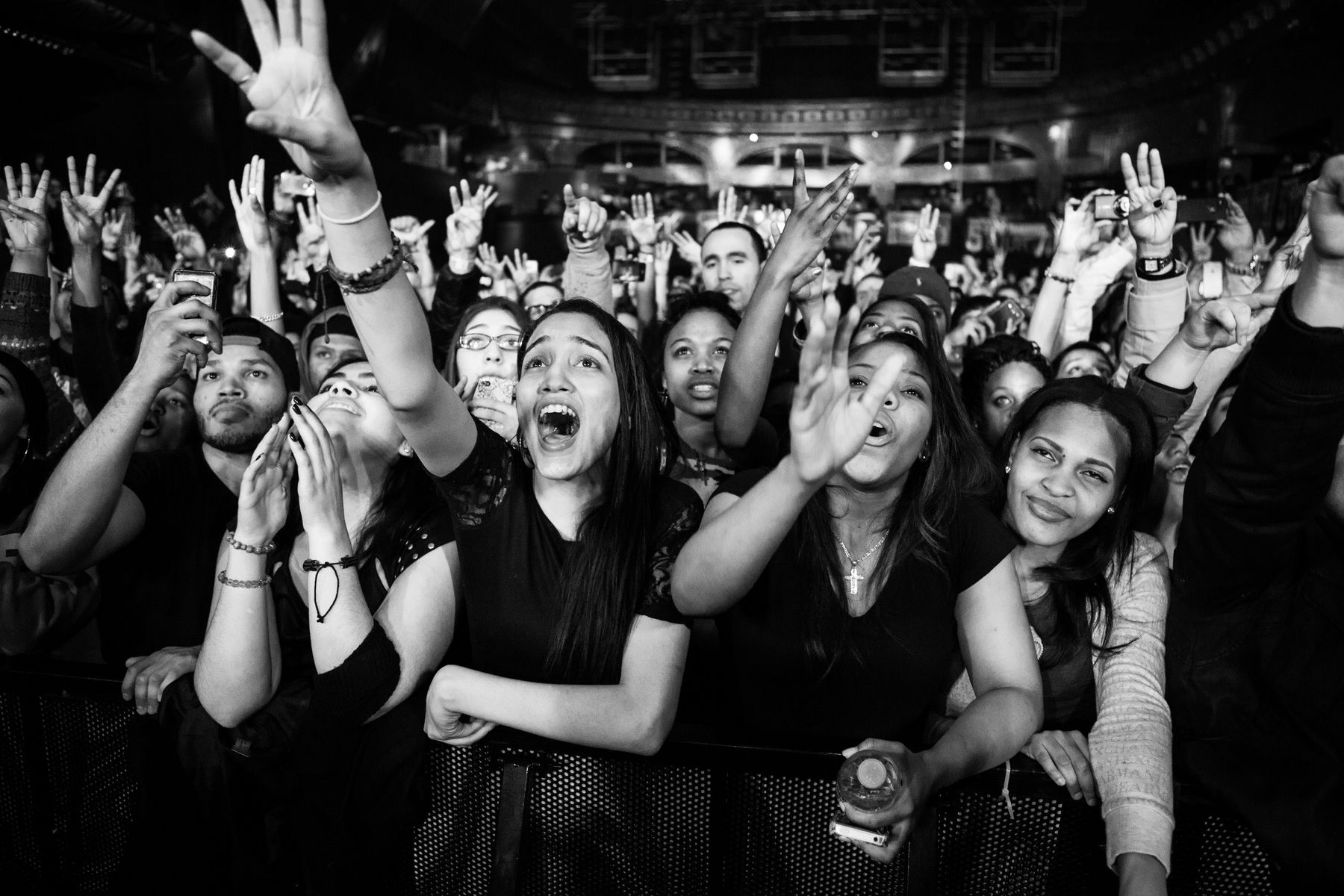
STEREOTYPE AND OBSESSION
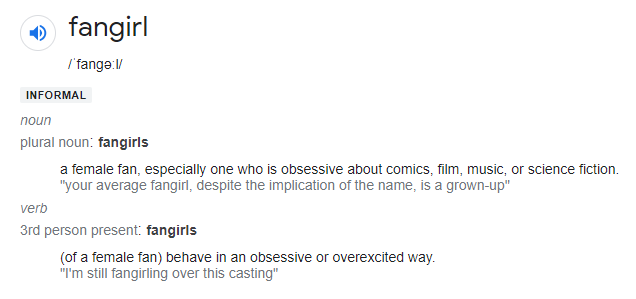
When even Oxford Languages defines fangirls as obsessive, there’s no surprise that most of society thinks so too. The word is almost always used as an insult unless it’s by someone describing themself. They’re often dismissed as ‘obsessed,’ ‘cringey,’ and ‘crazy.’ In a survey I recently conducted, these were the terms commented most when asked how people think fans are viewed by the general public.
“I think society views people who are obsessed with artists as sad and detached from the real world.”
Idolisation and the behaviour that results from this is seen in a negative light. A documentary airing on Channel 4 back in 2013 has received harsh criticism from fans everywhere, with many at the time using the hashtag #ThisIsNotUs to distance themselves and share their feelings. Crazy About One Direction appeared to highlight the minority of fans who acted and said things such as “I was outside your room while you were asleep,” and “I’m part of a fandom that could kill you if they wanted.”
As a result of focusing on extreme examples and obsession, those featured were met with online harassment, and despite not reaching the same level of fan behaviour, the majority of Directioners faced even more judgement than they were used to. There are even unverified claims of suicide.
Following the film, Liam Payne took to Twitter to say: “We couldn't give a fuck what any documentary says.” Regardless of what was shown, he defended and stood by his fanbase. As a freelance journalist, predominantly writing about music for Guitar and MusicTech, Rachel Roberts told me that none of the musicians she has interviewed have ever said anything negative about their fans: “If they do mention them it’s always positive. Many people have told me they don’t feel complete until they share their music with people face to face.”
We couldn't give a fuck what any documentary says there dramatised for entertainment and full of bullshit anyway we all know...
— Liam (@LiamPayne) August 16, 2013
“The media has a huge role to play in how society views fangirls,” she adds. “If you look at the way fans are portrayed in music documentaries or the news, they’re often made out to be crazy.”
Rachel has a love of alternative music but the genre isn’t free from its stereotypes: “I’ve always had the classic ‘Oh you’re a fan of (insert band here)? Name five songs!’”
“People think you’re being a fan for male attention. That’s the last thing I care about! Sexism is so rife in rock music, and that includes sexual harassment at gigs. I’m lucky to have never experienced that myself but it happens a lot. I don’t go in mosh pits because of it.”
One Direction was a huge part of Charlotte Taylor’s childhood. At 21 years old, she now considers how she was treated as a fan during her teenage years: “My parents were always super amazing and they would listen to me ramble on about them when I was younger. But at school, there was a lot of negativity and I felt like I had to hide the fact that I liked them. You were teased for listening to their music or talking about them so I only spoke to people who I knew liked them.” She adds, “these days I don’t really care what others think.”
Unfortunately, Charlotte is not alone. Bryana McDaniel, 17, has not only got her peers questioning her love for BTS but her friends also: “They think it’s so wild to like them but it’s just normal music in a different language. It upsets me, but it doesn't affect my relationship with them because I know it’s all in good fun and not mean-spirited.”
“As fans, we’re just showing support for the artists we love and the creators that make us feel happy. Personally, BTS and K-pop in general, have taught me to accept myself for who I am and people in society don't realise that music can have that impact.” Although she also argues that young teenage fans are generally seen as crazy, she remains hopeful: “I do see it slowly changing because the people in my generation are more accepting and they are growing up to be in the positions that run society. Over time I think it will get better, but maybe not 100%.”
To this day, many people assume this is what being a fangirl means. But, are they really crazy and obsessed or are they just passionate and dedicated?
At 12 years old, Danielle Stevens, now 19, became part of the 5 Seconds of Summer fandom. However, because she wanted to create a world far from her own, a fantasy to get away from all her problems, she became fixated. “It got to the point where I was constantly googling them, watching interviews, trying to get to know them inside and out. I wasn't looking up their addresses and sitting on their front doorstep waiting for them to come home, but it was an unhealthy obsession.” She reflects on this type of behaviour saying, “some people hyper fixate on something to get away from what their lives are. I think there's more of a psychological reason as to why.”
Lynn Zubernis, writer, clinical psychologist and professor at West Chester University, tells me this psychological reason can be explained by neurotransmitters. “Our brains are built to become deeply connected to things and that is in the mesolimbic system. There is a reinforcement circuit there so when we like something, that makes us want it and then when we get it, it feels really good for us.”
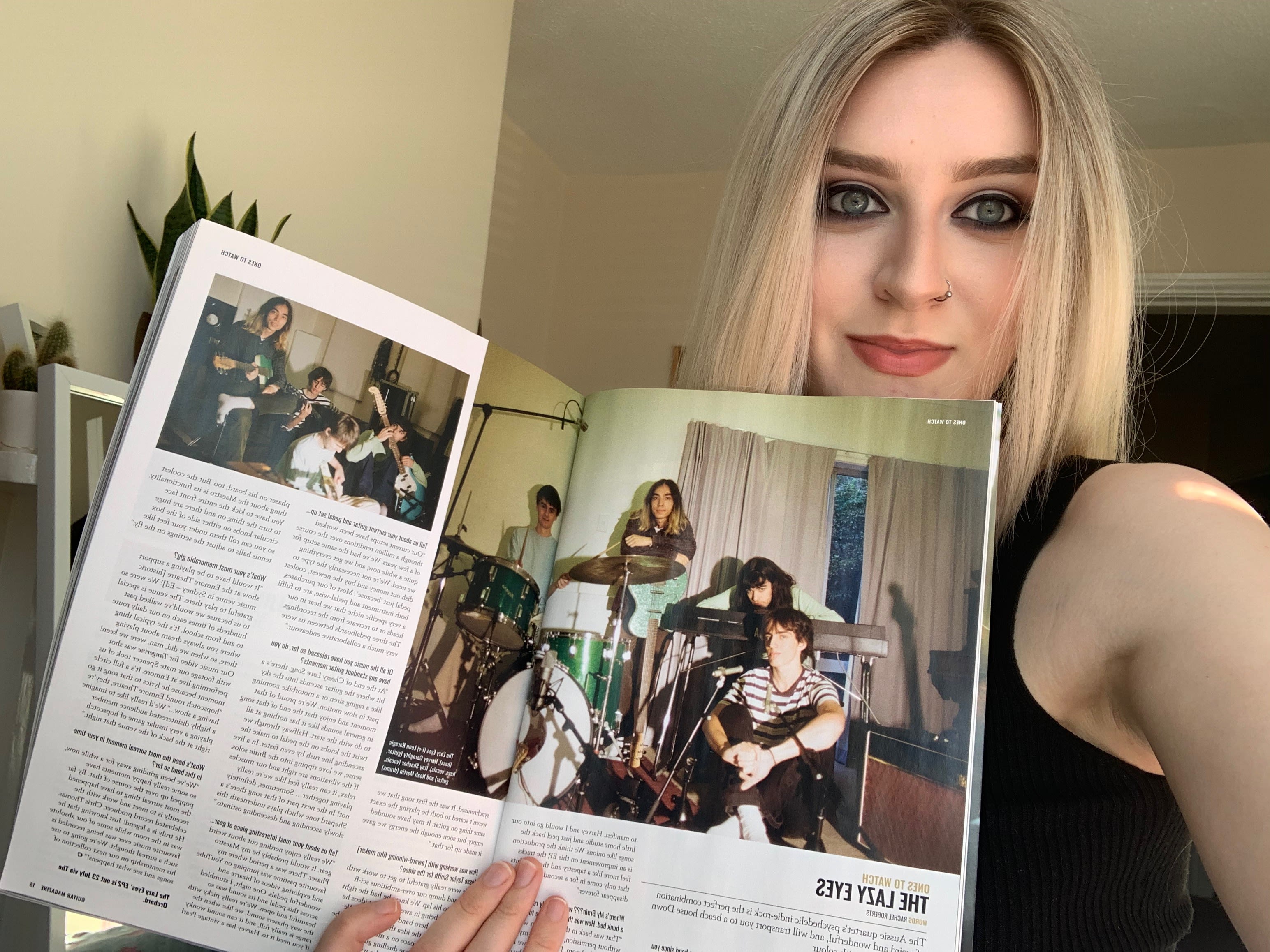
Rachel and an article with The Lazy Eyes in Guitar magazine: "It was the first ever interview I did for them following my work placement and also my first ever piece of work in print! It will always be a very special piece to me"
Rachel and an article with The Lazy Eyes in Guitar magazine: "It was the first ever interview I did for them following my work placement and also my first ever piece of work in print! It will always be a very special piece to me"

Charlotte and her sister at an Olly Murs concert
Charlotte and her sister at an Olly Murs concert

Bryana and her mum at a Oneus concert in Kansas. "It was my first ever K-pop concert and I loved every second of it. Being around people that were there to have fun and had the same interests as me. I was so thankful to go with my mom. Her and I had a blast!"
Bryana and her mum at a Oneus concert in Kansas. "It was my first ever K-pop concert and I loved every second of it. Being around people that were there to have fun and had the same interests as me. I was so thankful to go with my mom. Her and I had a blast!"
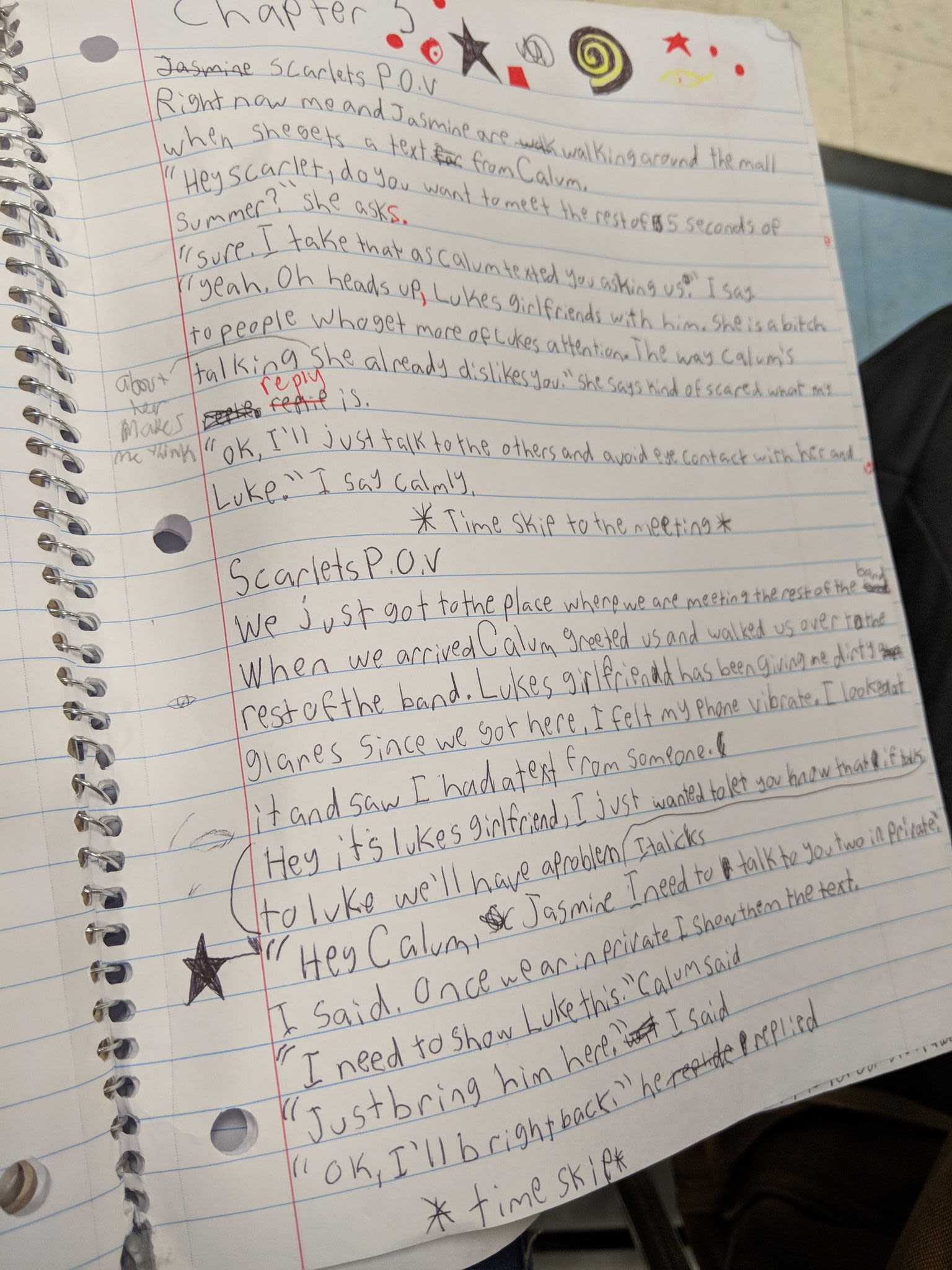
Danielle and her friend used to write fanfiction, this is a draft of one about 5SOS
Danielle and her friend used to write fanfiction, this is a draft of one about 5SOS

For Lynn, fandom has allowed her to get to know creators and actors, even writing a book with her idols
For Lynn, fandom has allowed her to get to know creators and actors, even writing a book with her idols
“My voice is taking the worst of it!” It's Lynn’s third interview of the day when we speak over Zoom, but she doesn’t show it. After sharing how excited we are for the weekend and deciphering the time difference (4:30 pm in Philadelphia and 8:30 pm in Cheltenham), I can hear the enthusiasm in her joyous voice come through my laptop speaker as we begin to talk about all things fandom.
“Fandom is complex. People certainly differ in the amount of obsessiveness and because of the way the brain functions it can tip into diagnosable pathology such as obsessive-compulsive disorder. Everyone has different vulnerabilities to that sort of behaviour. I don’t think that fans have any greater propensity to that than anyone else, people can develop obsession around almost anything.”
“The myelination process and frontal lobe might not be completely developed and that is where things like decision making are within your brain. I think we need to give adolescents a bit of a pass sometimes because their brains literally work in another way. Risk-taking functions differently within them, they are more responsive to hormones and adrenaline bursts which feels different to a teenage brain," she adds.
"Adolescents behave differently across the board and that is going to translate to them not always making the best decisions.”
Those stereotypical ‘crazy’ behaviours are often seen in teenagers more than anywhere else. Lynn has explained that learning appropriate boundaries and socialisation is all part of human development and knowing what is and is not acceptable is a lot harder when you are an adolescent.
You may have heard of the term ‘addictive personality’ and some experiences within fandom can feel like this, but what it boils down to is that reinforcement circuit working. Lynn suggests: “It’s not necessarily a bad thing, but when it becomes so much of an obsession that your relationships, work or financial situations are suffering, then the balance has been tipped. Most fans can sustain that balance and know how to titrate their experience in a healthy way.”
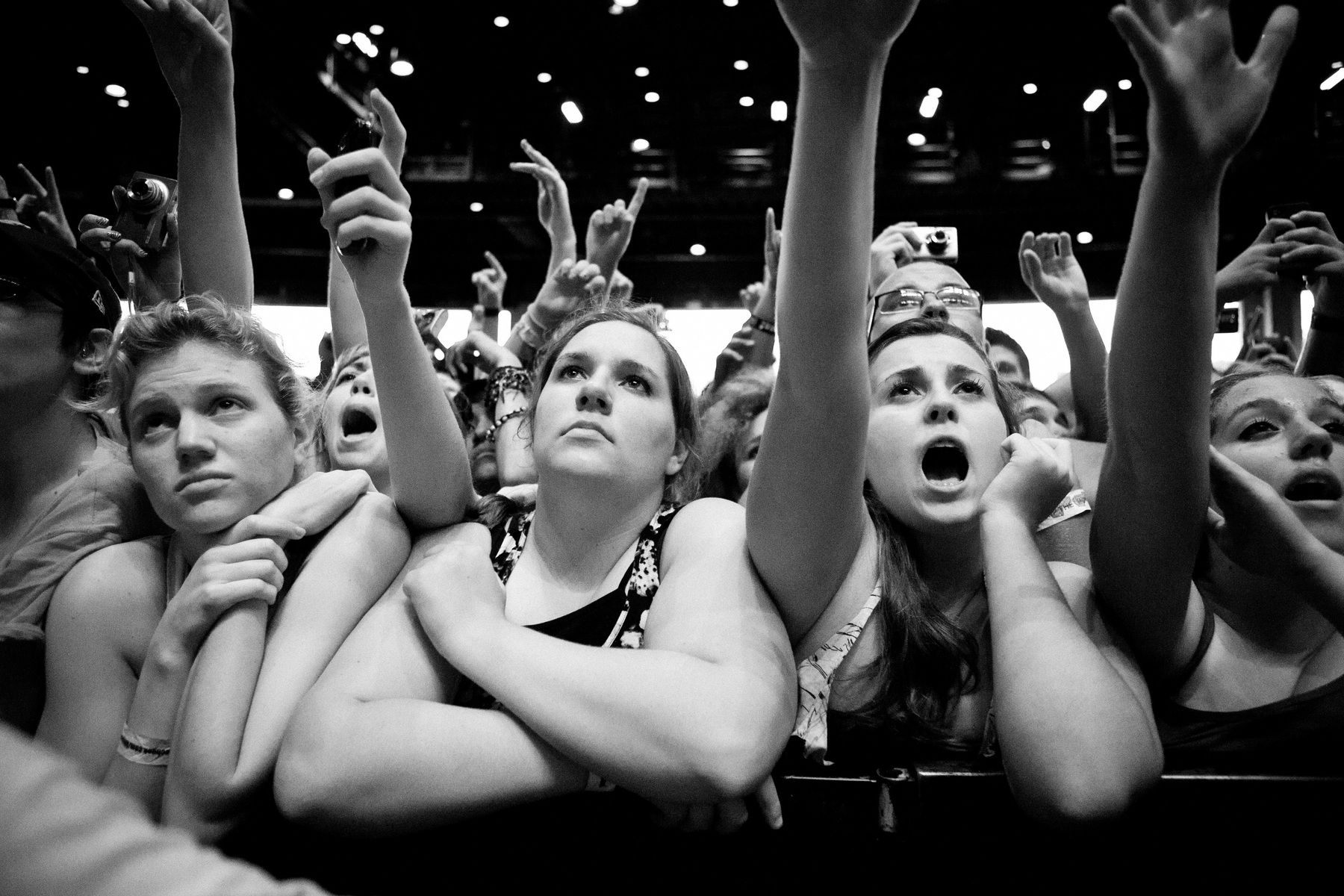
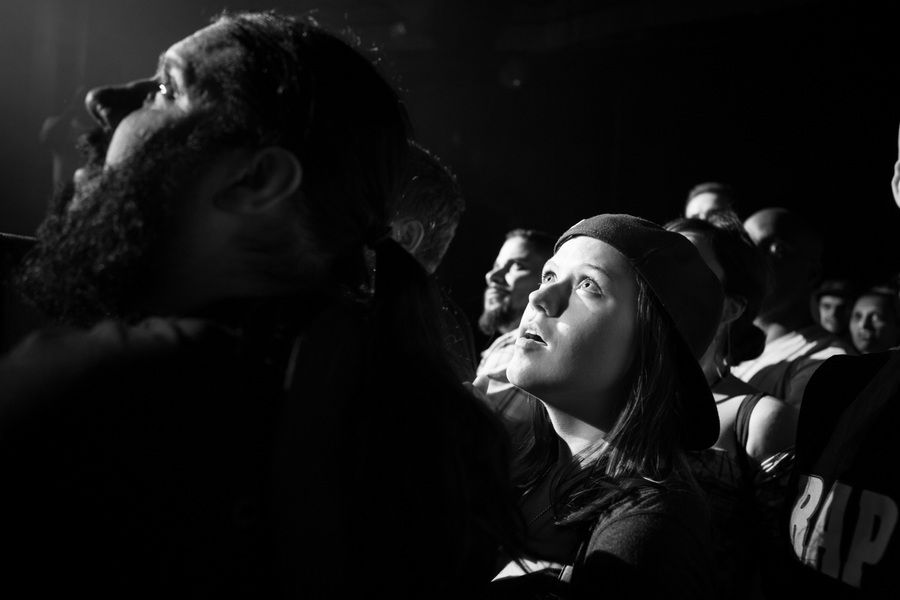
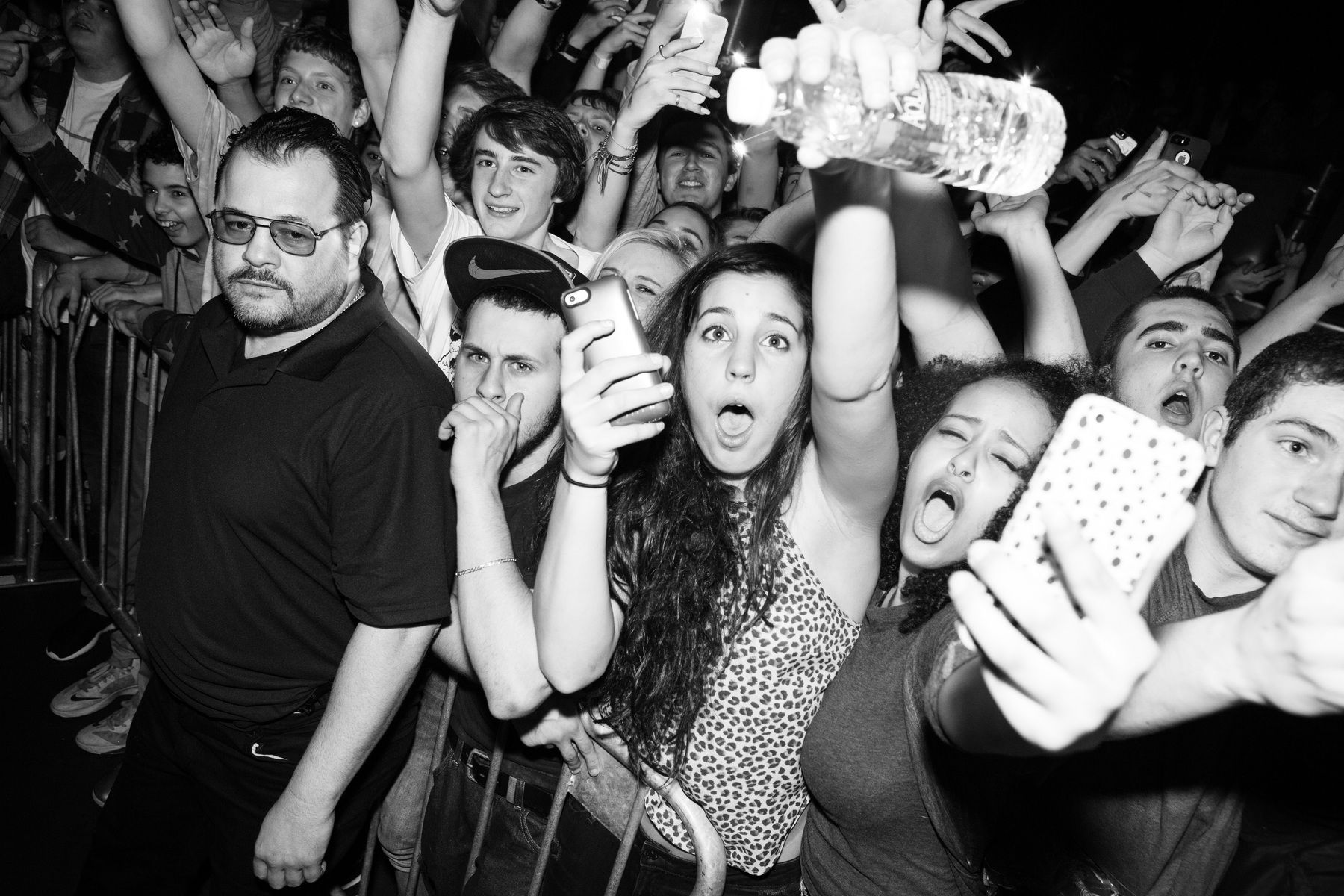
Some researchers have termed fan behaviour as an obsessive-addictive disorder called celebrity worship syndrome (CWS). It is suggested that celebrities receiving this worship are more likely to appear in TV, film or pop music. In A Clinical Interpretation of Attitudes and Behaviours Associated with Celebrity Worship, authors John Maltby, James Houran and Lynn McCutcheon “speculate that different dimensions of personality in part promote susceptibility to increasingly more extreme levels of celebrity worship.”
“We emphasise that these three dimensions of personality are not mutually exclusive; people have these three traits to different degrees.”
The dimensions are entertainment-social, which refers to the attraction to a celebrity's perceived confidence and ability to capture attention, intense-personal where fans have intense feelings, and borderline-pathological which relates to more extreme behaviours or fantasies. This final dimension “is thought to reflect a person’s social-pathological attitudes and behaviours that are held as a result of worshipping a celebrity.”
These researchers have since found a correlation between the disorder and mental health problems in the UK, such as anxiety, depression and stress. Psychology Today reports on this discovery saying that their data from 3000 adult participants showed that obsession is rare: “Only around 1% demonstrate obsessional tendencies. Around 10% displayed intense interest in celebrities. Around 14% said they would make a special effort to read about their favourite celebrity and to socialise with people who shared their interest. The other 75% of the population do not take any interest in celebrities' lives.”
Obsession and risk-taking are not unique to fandom and somewhere along in society, we have made the connection that fixation and fangirls are the same thing. However, these statistics show that the majority of fans are not like this.
SO, WHAT DOES BEING A FAN REALLY MEAN?
It wasn’t until adulthood that Lynn resonated with the term fangirl. In 2005, she fell hard for the TV show Supernatural and began to ask herself: “Is this okay? What is happening to me?” Being fascinated by the subject, she continued exploring and has now made a name for herself as a fandom expert. It has allowed her to publish multiple books, be a panellist at comic cons and fan conventions, co-produce a documentary and be a regular contributor for Psychology Today.
What makes her unique is that her understanding of fans comes from a professional and personal background. “The meaning of fangirl has evolved for me. When I first defined myself as a fangirl, there was some internalised shame attached to the term. I questioned: ‘Are fangirls frivolous?’ ‘Are fangirls silly?’ ‘Are they overly emotional?’ but now I feel very proud to be one,” she admits. “It means someone who is not afraid to tap into their creativity, to explore their own identity and to allow themselves joy. Fangirls are subversive, they refuse to colour inside the lines put there by society.”
When you look at the time and investment put into being a fan of a band compared to a sports team, it's all pretty similar. The reality is that fandom is fandom. “You will see adult men screaming, losing it or dumping their beer over someone's head and people don’t look weirdly at that. Yet, when teenage girls, or ‘god forbid’ grown women, go to a One Direction concert and are swooning over Harry Styles, they are going to be looked down upon.”
The behaviour and interests of women, especially in fandom, are even worse when they no longer fit into society’s idea of what and who a fangirl should be. Lynn has noticed that once you leave adolescence, people have a lot more opinions on what is or is not acceptable. “There's really no attempt to control the emotionality of grown men but there are a lot of subtle, and not so subtle, attempts to control the emotionality and sexuality that is connected to that emotionality, of women of all ages.”
Sexism and misogyny are recurring themes in the explanation of fandom and the way fans are treated. In my survey, I asked people to respond to this general and broad statement: ‘Teen girls are criticised for having interests.’ I found that 37% of men said they didn't agree compared to only 16% of the women. Perhaps the reason why this statement resonates more with women is that they would likely have experienced this behaviour first-hand, but what made the men disagree?
“Sometimes it is subconscious so they may even be denying it because they don’t realise it about themselves,” suggests Lynn. “We all absorb cultural messages. It’s called the authorised discourse in some psychological and sociological research, and it’s the things you are and aren't allowed to pursue or be happy and passionate about according to society. Those things are heavily policed and are different for men and women.”

What many people fail to realise is that young people make up the majority of the music business: “Among 16-24 year-olds, 62% reported streaming music during the past three months, compared to 19% of respondents over the age of 55,” according to the research on Digital music downloaders, streamers, sharers age profile in the UK 2020 by Statista. Fangirls play a huge role in this and Rachel has shared with me her point of view on the matter using her industry insight: “There is a negative connotation with the world fangirl as there’s sadly a lot of misogyny that still exists leading to female fans sometimes being seen by male fans and musicians as crazy. It is sometimes seen that they don’t really care about the music; they only go to gigs because they fancy the person performing or want to be a ‘groupie’."
"Realistically, fangirls fund a lot of the music industry! They’re the ones buying merch, researching their favourite artists and being incredibly passionate about the musicians they support. They put so much money into the music they love and they don’t deserve a bad rep.”
“I would also like to point out that things like the fashion industry, social media sites, and the careers of people like Harry Styles and Taylor Swift, would be awfully lacklustre if not for teen girls. They are one of the biggest consumer groups, and yet are treated like they aren’t worth very much at all.”
Fangirls can play into their own internalised misogyny also. As women are often faced with situations where there is pressure to justify their interests, they will end up testing each other as a way to create superiority within fandom. Hannah Ewens, journalist and author of Fangirls: Scenes from Modern Music Culture, has explored within her book the idea of a paid-for fan club. These are the fans that can obtain more rewarding fan experiences due to money that is willingly spent. Opportunities to meet your idols, get better seats at concerts, and own more merch, ultimately lead to a hierarchy: “Hierarchies exist in every teenage social group. The barely visible distinctions based on who your parents are, the school you go to, what you can and can't afford. Fandoms are no different.”
Visibility within fandom further solidifies your place among the hierarchy of fans as social media allows them to share experiences and paid-for opportunities. “For a lot of fans camping out and going to shows exist more as a semi-regular treat than a central part of the music fan lifestyle. Eighteen-year-old Lucia shares her frustrations with me. After meeting girls waiting at shows she’ll follow them on social media, and this is where comparisons are easily made. ‘You see these fifteen-, sixteen-year-olds getting to go to London and spending all their time and money on shows. It's not their money, it's their parents' money.’ She considers herself just as much of a fan, but recognises that how she and many others are able to show that love and dedication is hugely dependent on wealth and social class,” Ewens discovered.
Alongside paid-for fans, stereotypical ones and ‘normal’ fangirls, you can also get other types. Ex fans, like Danielle, can still hold fond memories of their old fandom despite no longer being active within it: “Their music never failed to put a smile on my face. They were always very goofy and even when they blew up they were still themselves and I really admire that. I met so many of my friends because of 5 Seconds of Summer and it brought me closer together with people.”
Grown-up fans literally grow with the fandom and continue to share their love for it when the music may not be so popular anymore. Kaylyn Moore has been listening to The Killers since 2005 and still considers herself a fangirl. The song The River Is Wild holds a special place in her heart: “It’s amazing how a song, especially one that came out over 15 years ago, makes you think of different things. I used to think about myself when I was a teen. Now, the song makes me think of my son and how I want him to be a good person; respectful, kind, hard-working, caring, and creative.”

Kaylyn waited after The Killers concert once and she got to meet Brandon Flowers!
Kaylyn waited after The Killers concert once and she got to meet Brandon Flowers!
THE BENEFITS TO FANDOM
Fangirls have been around ever since Elvis was named King and The Beatles walked Abbey Road. Admiration has even been noted back to the 1940s, but at the time they were known as ‘bobby-soxers’. A Guardian report from 1945 on Frank Sinatra and the ‘bobby-soxers’ describes a “remarkable phenomena of mass hysteria” sweeping the US: “One young woman is known to have sat through 56 consecutive performances, which means about eight consecutive days. Some of the youngsters faint with hunger and fatigue after sitting six or eight hours without food, but still refuse to leave until they are bodily removed by the attendants.”
The behaviour we relate to fans today isn’t anything new, so why do people dedicate so much of their lives to fandom? What makes it so popular and why has it been around for so long?
Music can affect you deeply. You can connect to it from an early age and this power is reflected in our memories and emotions. Jude Rogers, proudly Welsh and full-time music fanatic, shares with me why this is: “I always try to find connections with words. Some songs you respond to because they just sound good and there are some songs where the lyrics speak to you.”
“When I was young, six years old, I really liked Wham! and my favourite song was Freedom. The lyrics still don't really impact me but it was the sound of George Michael's voice and the melody of the song.”
Jude is a culture writer, broadcaster and critic, with work regularly published in The Guardian and The Observer. Across her career, she has interviewed a number of big-time celebrities including Elton John, Paul McCartney, Dolly Parton and Amy Winehouse. With music being a central part of her life and relationships, she has recently published her book The Sound of Being Human: How Music Shapes Our Lives.
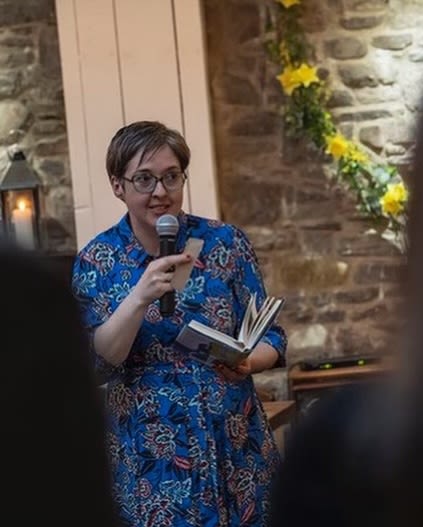
Jude reading at her book launch recently
Jude reading at her book launch recently
“Lyrics can amplify your connection to a song sometimes. As you get older, they become more important,” she adds. “As fans, we always look for messages within songs. I think people see themselves within the lyrics. When I first got into music as a teenager, liking boybands and girl groups, I wanted the boy I fancied to be speaking to me and I saw the girls as though they were friends!”
For many people, the benefits of fandom are the relationships, connections and friendships made.
“We weren't stalkers. We weren't groupies. We were a group of friends that passed the time with each other, waiting for the Beatles on the 'steps' of No. 3 Savile Row.”
Growing from nine to 17 members, The Apple Scruffs gathered outside of The Beatles' offices on a regular basis between 1969 and 1972. They are a dedicated, tight-knit group of followers within their fandom, becoming so well-known that George Harrison wrote a song for them. It’s been years since the height of Beatlemania yet they continue to be active fangirls across their website and social media. “We formed strong long-lasting friendships because of The Beatles and they were a big impact on our lives and still are today,” they told me.
Twitter is hugely important for fandom. For Danielle, it has allowed her to connect with other K-pop fans and the people she has met have since become best friends: “We’ve all talked about meeting up before and I just see them as my own family. I’d probably say that’s one of the best times I’ve had being a fan because it brought me together with these amazing people.”
Jayne Harrison-Bond is 48 years old, but it wasn’t until she was 35 that her love for The Killers grew. It all started because she met her now-husband, Ian; she had never taken much notice of their music before, but he was a fan.

Jayne and Ian at The Killers concert: “Most of my family enjoy them too and some come to occasional gigs with us!”
Jayne and Ian at The Killers concert: “Most of my family enjoy them too and some come to occasional gigs with us!”
“The Killers are now a massive part of my life and made a huge impact on our relationship. My husband has equally grown to love them more and going to gigs and listening to their music is our happy thing. We are due to go to four gigs this year, we are so excited!”
Alongside the communities fandom creates and its sense of belongingness, there are two other reasons why fandom is good for your mental health, according to Lynn; it is a de-stressor and it allows you to be creative. Activities such as writing fanfiction, going to concerts and meeting up with other fans, are all ways to step away from the worries in our lives, away from screens and to stop doomscrolling.
“It tends to be a very communal undertaking and in fandom you do want to seek out other people which gives you a sense of belonging in a group of like-minded people,” says Lynn.
“Because fandom is a different kind of community, it has different norms and values. It tends to be more encouraging of things like creativity and exploration and tapping into your real self. Many people find ways to express themselves in ways they've never done before. I know people that, out of support from their fandom, have become photographers or writers or dancers because they were encouraged and supported to tap into that creativity within their fandom community.” Without being allowed to express her own creativity, she believes she wouldn't have had the confidence to get published. She credits this to fandom.
“It is good for us to have something to be passionate about. It brings us joy, it allows us for periods of escape from pressure, it allows us time to indulge our creativity because fandom involves a higher level of play than our everyday lives do. All of that is good for people, it just might seem unusual to someone that is not within fandom.”
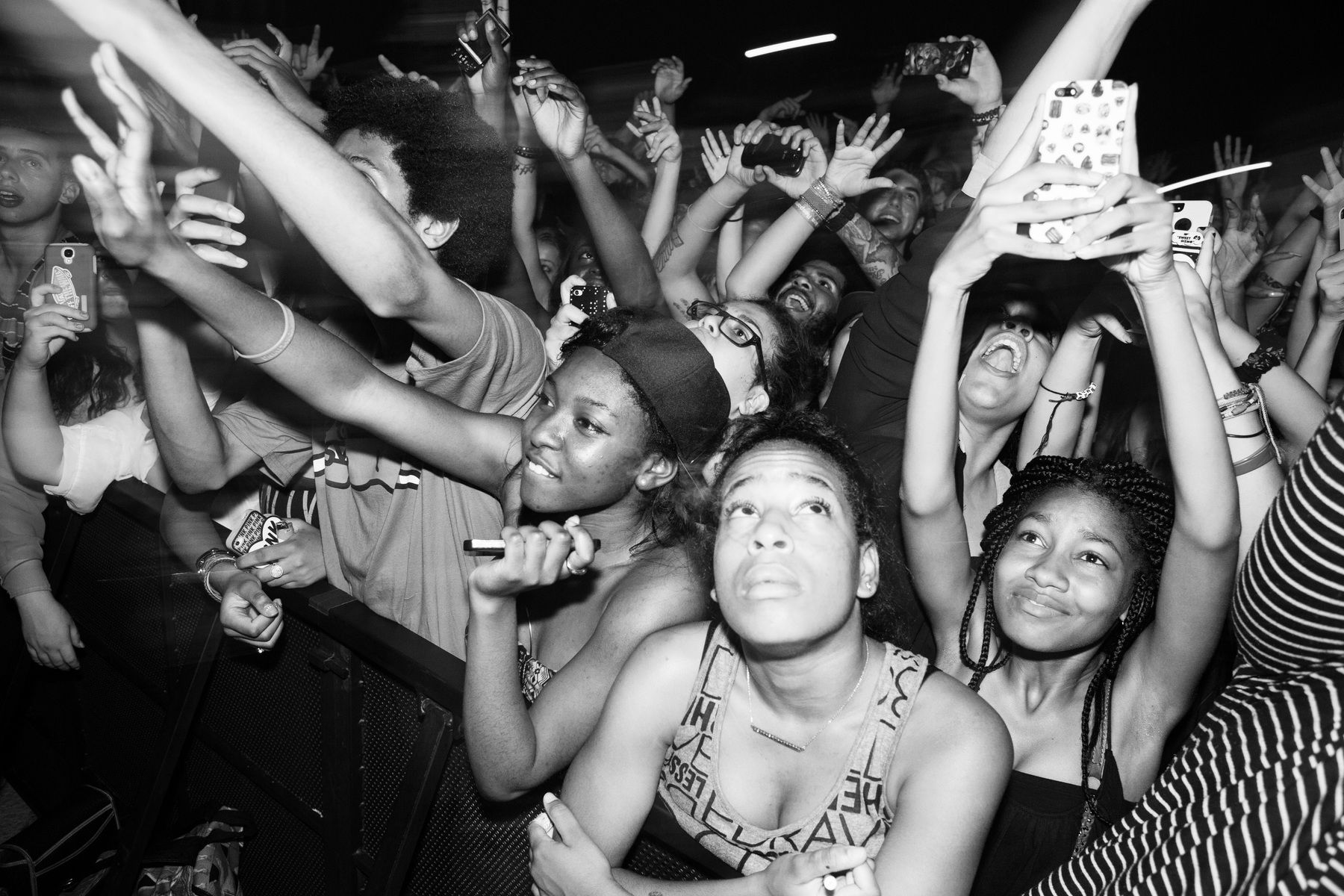
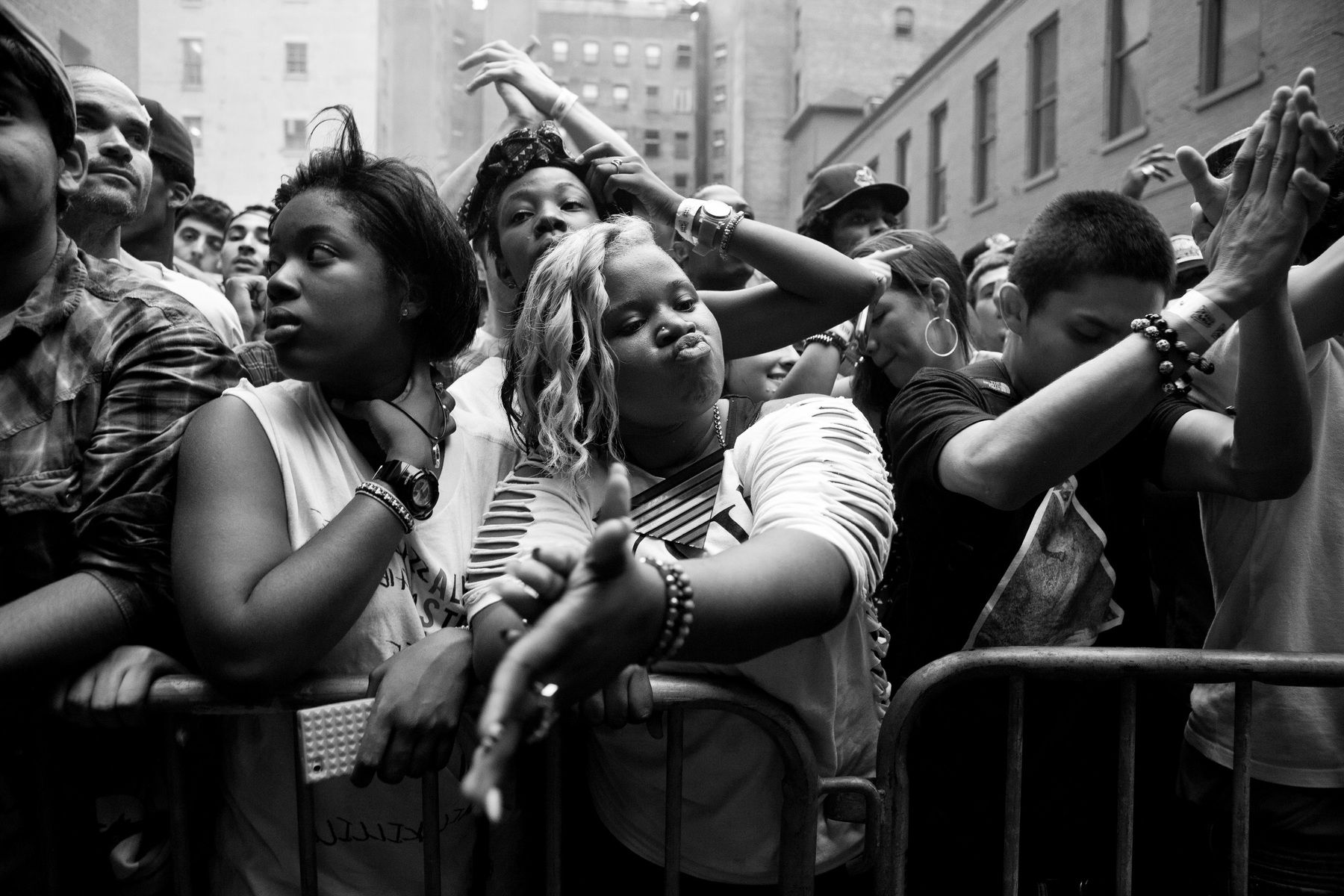
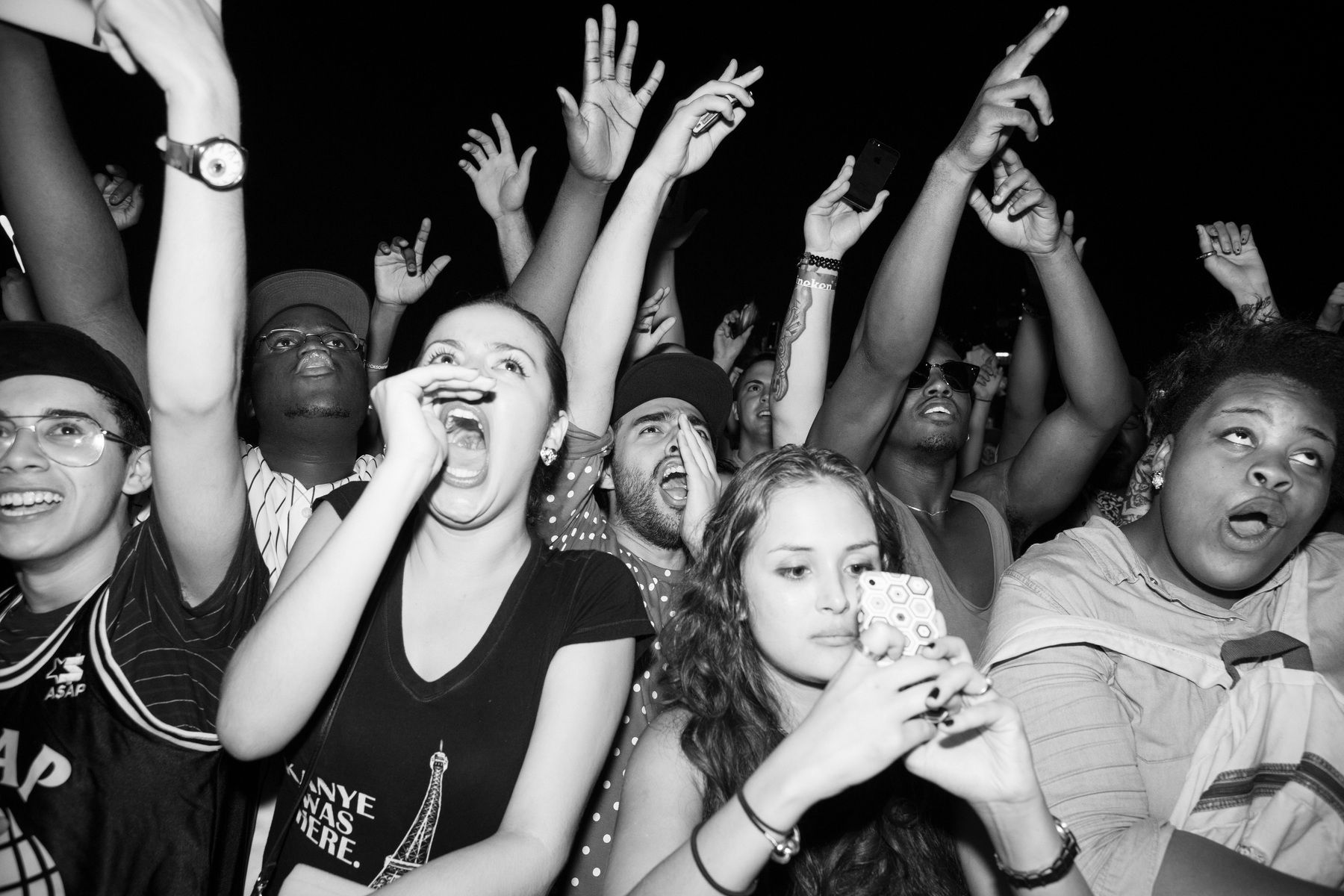
Fangirls are subject to the sexism and misogyny ingrained within society and the music industry. Passionate young women are unrightfully seen as crazy because although obsession is rare, it is within us all. Most people overlook how fandom can be hugely beneficial to improving mental health. So, if you see or hear negative comments directed towards any fan, don’t be afraid to tell the truth about fandom.
“When I write about how life-changing fandom can be, I am including myself in that equation because it certainly changed my life.” Lynn continues to undertake her work as a hybrid of academic and fan, sharing her research and connecting with fans through her online platform Fangasm. She has had many adventures because of fandom and advises you all to just “let yourself be joyful!”
Share your passions with everyone. Don’t be afraid of judgement. Don't be afraid to wear your tour top until it fades. Know that anyone can be a fangirl - as long as you’re brave enough.
Resources:
Samaritans Call 116 123
Mind Call 0300 123 3393
The National Bullying Helpline Call 0300 323 0169